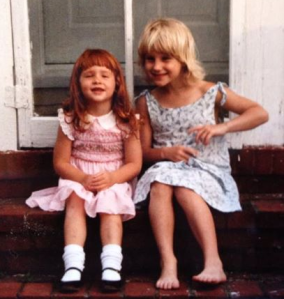It wasn’t even on my mind until my necklace broke.
I got dressed this morning and finished off my outfit with a string of red beads that I salvaged from my Grandma Vivian’s jewelry box after the family had gone through it and divvied up all the nice, valuable pieces. I refused to let them throw out her cheaper, every day jewelry, and the necklace I had on this morning was just one of many mementos I took.
I was going about my business this morning when the necklace fell off my neck and red beads scattered across the floor and I remembered that Grandma died a few days before Easter ten years ago.

I still miss her. I talk about her all the time. How when we lived just a few houses down from her and we’d ask her to make us French toast and she’d say “bring me an egg,” so my brother and I would walk down the road to her house cradling a single egg each in our hands. Or how she used to put words to the birdsongs when we would go walking in the park—one bird, she insisted, shouted “Go Redskins!” And she would always warn me about the trolls that guarded bridges.
I vividly remember one snow day I spent at her house. I built a snow man in the front yard and when she came to assess it, decided that it wasn’t quite special enough. Together we gathered branches of off a pine tree and used them to make a hula skirt. Then grandma added two pieces of pine cone to give our snow-hula-dancer a set of buck teeth. Then we went inside for a bowl of “macaroni soup” (that’s plain chicken broth with a few fat macaroni noodles floating in it.)
Grandma loved Tiny Tim songs and John Phillip Sousa marches. She loved Garrison Keillor’s A Prairie Home Companion, and would put on old cassette tapes of the show for long drives to Chincoteague. Grandma loved Chincoteague and took enormous pleasure in spotting the water birds, digging for clams in Tom’s Cove, and picking crabs for hours, coaxing every last little bit of sweet crabmeat from the shell.
When I was older, after our family had moved out to the rolling countryside of Loudoun County, I would often be delighted to come home from school to find Grandma’s Volvo parked in the driveway. I’d come in side and she’d be in the kitchen snacking on a grapefruit which she’d carefully peeled and pulled apart the segments, or maybe a thinly-sliced cucumber soaking in a bowl of vinegar. She took enormous pleasure in harassing our cats with brown paper bags or pieces of string.
One day when she was at the house I asked her if she had a stamp. She went rummaging in her purse to find one and pulled out an old business card. She showed it to me and told me the story of the first time she ever left her childhood home in North Dakota; she met a salesman on the train and spent some time chatting with him, and when he left he handed her his card. She wasn’t sure why she’d kept it all these years. And then she handed it to me. And I still have it.
I miss Grandma. I miss the sound of her scratchy voice singing, “Tea for two and two for tea! Me for you and you for me!” I miss the distinct shape of her salt and pepper hair. I miss her dismissing me over the phone as “a fountain of information,” when my apathetic teenage self didn’t know where my mother was or when she’d get home. I miss staying at home with her on a Saturday night watching Keeping up Appearances and As Time Goes By.
I gathered the red beads from grandma’s broken necklace off my office floor and put them in an envelope. Soon I’ll re-string them with a bit of thread and put them back in grandma’s old jewelry box (yes, I kept the box too) with her teardrop-shaped flower earrings, and her Smithsonian volunteer pin. I’ll think of her every time I wear her black knit wrap dress, or gaze on her favorite pair of alligator shoes which sit on a bookshelf in my living room, or spy on egrets in Chincoteague, or hear the Washington Post March, or eat a vinegary cucumber or . . .





